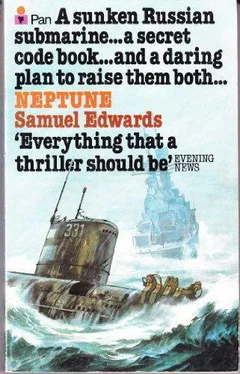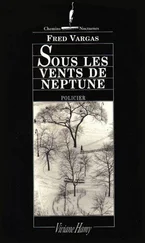Samuel Edwards - Neptune
Здесь есть возможность читать онлайн «Samuel Edwards - Neptune» весь текст электронной книги совершенно бесплатно (целиком полную версию без сокращений). В некоторых случаях можно слушать аудио, скачать через торрент в формате fb2 и присутствует краткое содержание. Город: London, Год выпуска: 1978, ISBN: 1978, Издательство: Pan Books, Жанр: Шпионский детектив, Триллер, на английском языке. Описание произведения, (предисловие) а так же отзывы посетителей доступны на портале библиотеки ЛибКат.
- Название:Neptune
- Автор:
- Издательство:Pan Books
- Жанр:
- Год:1978
- Город:London
- ISBN:0-330-25006-X
- Рейтинг книги:4 / 5. Голосов: 1
-
Избранное:Добавить в избранное
- Отзывы:
-
Ваша оценка:
- 80
- 1
- 2
- 3
- 4
- 5
Neptune: краткое содержание, описание и аннотация
Предлагаем к чтению аннотацию, описание, краткое содержание или предисловие (зависит от того, что написал сам автор книги «Neptune»). Если вы не нашли необходимую информацию о книге — напишите в комментариях, мы постараемся отыскать её.
The Russian atomic submarine ZOLOTO lies crippled and abandoned on the bed of the South China Sea. The secrets entombed inside are vital to both east and west. A custom-built super-dredger NEPTUNE assembled under maximum secrecy and plagued by agents of Soviet Russia and Red China, is bound on a clandestine salvage operation to capture the prize that could mean nothing less than world domination…
Neptune — читать онлайн бесплатно полную книгу (весь текст) целиком
Ниже представлен текст книги, разбитый по страницам. Система сохранения места последней прочитанной страницы, позволяет с удобством читать онлайн бесплатно книгу «Neptune», без необходимости каждый раз заново искать на чём Вы остановились. Поставьте закладку, и сможете в любой момент перейти на страницу, на которой закончили чтение.
Интервал:
Закладка:
Verschek laughed, displaying a gold tooth. ‘You are wise to retire,’ he said. ‘When a man has nothing more to learn in his profession, it becomes boring to him.’ He stood and retrieved his newspaper. ‘All the same, I dare say we shall meet again.’
‘I sincerely hope not.’
The Russian’s smile was bloodless. ‘Good luck,’ he said, and 180 sauntered down the long porch in the direction of the hotel entrance.
The crisis was at hand. Two heavyset Russian agents were sitting about fifty feet down the porch, and Porter knew they intended to rob him of the money as soon as their superior disappeared from sight and could disclaim any knowledge of the incident.
He was equally certain they planned to murder him. If he survived and passed the word to the world intelligence community that the Russians no longer kept a bargain it would be very difficult for the KGB to hire the informers who were the lifeblood of every secret service. Besides, he had performed a vital function and now was of no further use to Moscow, and it was Andropov’s way to dispose of someone in that position.
He had selected this very place in the porch because he had known how the Russians would react, and he had less than a minute to put his own carefully made plan into effect. The moment Georgi Verschek disappeared from the porch his men would act.
It was growing dark, and the lights that illuminated the garden and lawns had not yet been turned on. Porter turned away from the KGB pair so they couldn’t see what he was doing. Taking his Magnum from his shoulder holster he released the safety catch, made sure the silencer was securely in place, and then poised for a leap.
Suddenly he bolted over the waist-high railing and, crouching low, raced for the temporary security of a clump of palms about ten yards to his left.
A bullet landed in the trunk of a tree scant inches from Porter’s head. The Russians were using silencers on their weapons, too.
He threw himself to the ground to make them think he had been hit, rolled forward and sprang to his feet again behind the cover of the thick palm trunks. Other KGB agents undoubtedly were in the grounds, too, but he first had to make a stand against this pair in order to win a brief breathing spell.
They separated and advanced cautiously.
The half-light of dusk was deceptive, and Porter realized they would make better targets if he allowed them to advance closer, but he couldn’t afford the luxury of waiting. He aimed at the man on the left, squeezed the trigger and then fired at the second agent.
One dropped to the ground, and as his companion turned to him Porter sprinted across the lawn towards the fence that surrounded the hotel property.
He ran past the swimming pool, where several bathers stared at him.
As he reached the five-foot steel fence the floodlights were turned on. Jamming his Magnum into its holster he climbed over the fence.
It had been his intention to hail a taxi, but a more attractive alternative suddenly presented itself. A number of local residents, most of them presumably men and women who worked the day shift at the hotel, were standing in a queue and boarding one of the old double-decker buses that had been imported when Singapore had still been a British colony.
The last two men were climbing on board when Porter joined them, hauled himself on to the bus and lost himself in the crowd as the vehicle started to move.
It gained speed, but before it turned a corner he caught a glimpse of three men with blond hair climbing the hotel fence and dropping into the street outside. For the moment, at least, he had lost them, and he concentrated on paying his fare. In spite of his intimate knowledge of Singapore this was the first time he had ever taken a bus in the city and, to the amusement of his fellow passengers, he didn’t know how much to pay.
He stayed on the bus until it reached the crowded Chinese district, and there he transferred to another that was headed in the direction of the waterfront. When he left it at the end of its run he saw he was about a mile from his destination, but there were no taxis here, so he had to make the last stage of his escape journey on foot.
The Singapore harbour, a vast jungle of ships and cranes and modern machinery, was responsible for the city-state’s prosperity, and was active twenty-four hours per day. Freighters and tankers were unloading and taking on cargo at their berths, a dozen passenger vessels rode at anchor, and there were even more sampans and junks, some of them diesel powered, than could be seen in Hong Kong.
A sea of oil storage tanks stretched inland, and beyond it were huge warehouses. There were factories everywhere, too, some manufacturing products of Malaysia’s tin and rubber, others making biscuits and tomato sauce and scores of other processed foods for Singapore’s own millions.
Along the street that faced the water were the cheap bars, hotels and brothels found in any great port, and merchant seamen went from one tavern to another until they had spent all of their money. Prostitutes of many nationalities were on hand, too, and a number accosted Porter, but quietly shrugged off his indifference. Singapore was a gentle city, her people having taught themselves the self-discipline of living together in harmony, and it was said that only rarely was a drunken sailor robbed.
For the moment Porter felt in no danger, but he took the precaution of looking back over his shoulder repeatedly, and several times he stepped into a doorway and paused to make sure he wasn’t being followed.
At last he saw what he was seeking, a concrete wharf that stretched about three hundred feet into the water. Bobbing up and down in the water beside it was a large helicopter resting on pontoons. On the wharf, visible in the light of a street lamp, was a sign:
Only the discerning might have noticed that this powerful aircraft was too large and modern for its advertised purpose. No lights were burning on board, and the operators of the venture appeared to have taken themselves elsewhere. Few tourists came into the area, but the pedestrians wandering past the wharf did not think the presence of the helicopter strange, and paid little attention to it. Merchant seamen in search of a drink or a girl had other matters on their minds.
A pistol shot sounded, and a bullet chipped cement from the wall of a warehouse behind Porter.
He reacted instantly, dropping to a squatting position and extinguishing the street light with a single shot. The whole area was thrown into darkness.
A pair of tarts making their way up the street ducked for cover into the nearest bar, and several meandering seamen scattered. In almost no time the immediate neighbourhood was virtually deserted.
Porter crept forward along the base of the warehouse, and in the gloom he could see three figures near the wharf, blocking his access to it. He sent a rain of fire at the trio, then ran across an open space to the wall of the next building, the entrance to a dilapidated brothel.
One of the trio was sprawled on the ground, but the others remained vertical, and peered through the darkness as they searched for him. One down, he thought, and two to go.
Porter squeezed the trigger again, sending a spray of fire back and forth as he criss-crossed the target area. A second of his foes fell, and the third took refuge behind a pylon.
It would be difficult for the enemy to miss if Porter stepped into the open, so his situation required the use of cunning. He had emptied the Magnum in this last burst, so he slipped in a new cartridge. Then he took careful aim with the empty casing, and heaving it as he would a hand grenade, he threw it so it landed on the wharf to the side of the surviving member of the trio.
Читать дальшеИнтервал:
Закладка:
Похожие книги на «Neptune»
Представляем Вашему вниманию похожие книги на «Neptune» списком для выбора. Мы отобрали схожую по названию и смыслу литературу в надежде предоставить читателям больше вариантов отыскать новые, интересные, ещё непрочитанные произведения.
Обсуждение, отзывы о книге «Neptune» и просто собственные мнения читателей. Оставьте ваши комментарии, напишите, что Вы думаете о произведении, его смысле или главных героях. Укажите что конкретно понравилось, а что нет, и почему Вы так считаете.












